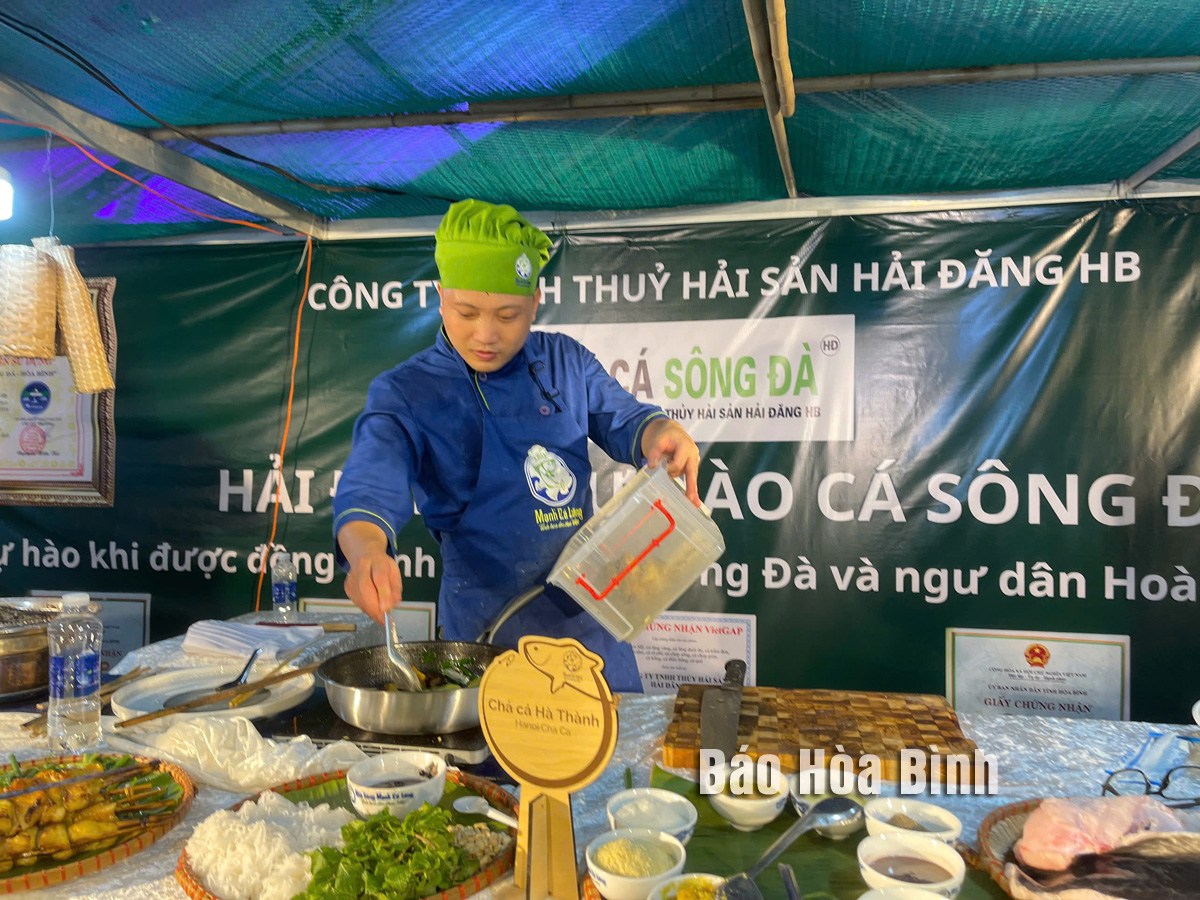
Hoa Binh province currently has 158 products granted at least three stars under the "One Commune, One Product” (OCOP) programme, including 114 food products. Among them, there are five aquatic products given four stars. They have gradually won consumers’ trust and created a new livelihood development trend for farmers and businesses in rural areas across the province.
The Hai Dang Fishery Products Co. Ltd. frequently
takes part in fairs in Hoa Binh province and other localities to market its
products made from the Da River’s fish.
Over the past years, aside from issuing support
policies for the sustainable development of cage fish farming and successfully
building the brands of "Ca Song Da - Hoa Binh” (Fish from the Da River - Hoa
Binh) and "Tom Song Da - Hoa Binh” (Shrimp from the Da River - Hoa Binh), the
province has stepped up the development of OCOP aquatic products, thus
practically benefiting product marketing and sale.
Fish farming has long been practiced in Tien
Phong commune of Da Bac district as five of this commune’s hamlets are adjacent
to the Hoa Binh hydropower reservoir. However, due to sale difficulties and
lack of access to scientific and technical advances, the activity was not a
main source of livelihood for local residents.
In early 2023, the Da Giang Eco Cooperative was
set up to boost production and sale connectivity among fish farming households
in Tien Phong, helping ensure stable income for many. The same year, the black
carp, black bagridae, and "ca ngach” (Cranoglanis bouderius) products from the
Da River were recognised as three-star OCOP products, giving further
encouragement to the development of cage fish farming here.
Director of the cooperative Xa Ngoc Hung said
the OCOP recognition has provided a more favourable condition for the
cooperative to market products. As a result, the value of products has been
increased, farmers’ income improved, and a sustainable development direction
created for local aquatic products.
There are currently 10 aquatic product
processing and preserving establishments in the province, comprising three
companies, one cooperative, and six business households. Meanwhile, Hoa Binh
now has five aquatic products (fish fillet and fish floss) granted four stars
under the OCOP programme.
Agricultural authorities said OCOP products are
assessed and classified according to the national criteria, which cover many
aspects such as quality, community value, cultural value, and production and
trading capacity of their owners.
Therefore, the sector is piloting some cage fish
farming models applying the VietGAP standards, developing more OCOP products to
improve quality and value, boosting connectivity among stakeholders under value
chains, and promoting concentrated and large-scaled production, said Luong
Thanh Hai, head of the sub-department of fisheries.
As of October 2024, there were 4,987 fish cages
across the province, expected to generate an output of 10,000 tonnes worth 600
billion VND (23.7 million USD) this year. Fourteen aquaculture establishments
with 1,067 cages have received VietGAP certificates, producing about 2.1 tonnes
of products each year.
Meanwhile, the annual amount of processed
aquatic products stands at about 850 tonnes, equivalent to just 11.33% of the
total farmed and caught output in Hoa Binh Lake, according to the
sub-department of fisheries.
After the Lunar New Year (Tet) holidays, trade union members and workers in Hoa Binh province returned to work with an excited spirit at the beginning of the new spring. Throughout the workshops, factories and enterprises, they were full of enthusiasm, immediately getting to work, striving to excellently complete tasks and production and business targets.
Red grapefruit is a native crop of Tan Lac district, where the fertile soil and favourable climate create ideal conditions for its growth. With over 80% of the area being mountainous, at an altitude of 300-400 metres above sea level, red grapefruits here thrive on well-drained, fertile hillside soil. The region’s large temperature variation between day and night enhances the fruit's nutrient absorption. The local cultivation techniques also contribute to its uniqueness
The provincial business association recently convened a conference to review its 2024 operations and outline plans for 2025. The meeting was attended by Standing Deputy Secretary of the provincial Party Committee and Chairman of the provincial People’s Committee Bui Duc Hinh along with leaders from various departments and agencies.
Hoa Binh province is prioritising rural transportation infrastructure to improve mobility, facilitate trade, and boost socio-economic development.
The Minister of Agriculture and Rural Development has just issued Decision No. 377/QD-BNN-VPĐP approving the results of the evaluation and classification of the products of the National One Commune One Product Program in 2024 (phase 3).
As the Lunar New Year (Tet) approaches, the market becomes more vibrant than ever. In Hoa Binh province, preparations for Tet have been bustling since the 20th of the last lunar month, with an abundant supply of goods to meet the growing consumer demand.



